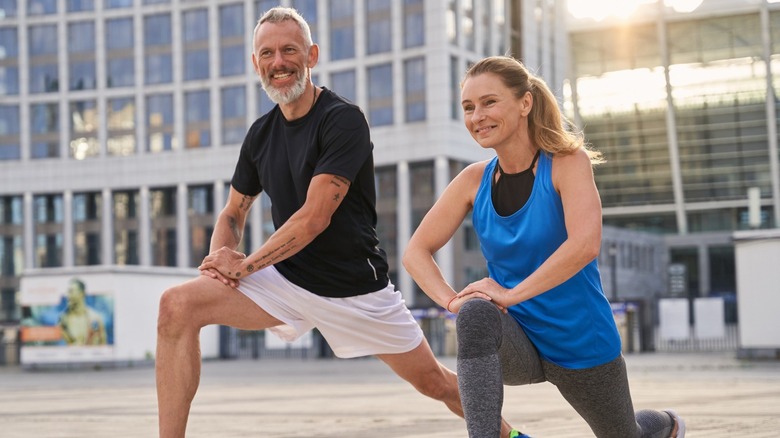If you’ve been diagnosed with some form of anxiety or depression, you’re not alone. According to the Anxiety & Depression Association of America (ADAA), anxiety disorders are the most common kind of mental illness, affecting over 40 million Americans over 18 years old, or nearly one in five people. And nearly half of those diagnosed with an anxiety disorder also suffer from depression (via WebMD).
While the connection between exercise and mental health is complex, experts across the health spectrum acknowledge that people who engage in regular physical activity tend to have lower rates of mental illness and a greater sense of well-being (via Better Health Channel). For one, exercise improves the quality of sleep, which can help improve your mood. Exercise also influences mood-lifting chemicals in your brain, such as serotonin. Exercise can also help to avert your focus from negative thoughts and allow you to work out your frustrations. Even just two and a half hours of moderate physical activity every week can support good mental health.
This is good news for those dealing with a mental health issue. And if you’re struggling with anxiety, depression, ADHD, or some combination of these conditions, you should know that there are specific kinds of workouts that can address your mood.
Try these exercises for anxiety, depression, and ADHD

While anxiety, depression, and ADHD are all a type of mental illness, they each have unique symptoms, which is why neuroscientist Kristen Willeumier, Ph.D., recommends specific types of exercise for each of the conditions. For instance, given that people diagnosed with ADHD tend to lack attention and focus, Dr. Willeumier tells MindBodyGreen that high-intensity interval training (HIIT) is going to be the best workout style for these individuals because of the quick boost of dopamine to the brain, which research indicates could elevate levels of concentration. She suggests that boxing may deliver the same benefits.
More sustained aerobic activity, such as a 30-45 minute run, is likely going to best benefit those suffering from depression. Dr. Willeumier explains that this is a good match because activities like running, swimming, and biking can raise serotonin levels, which can lead to a sense of calm. If you suffer from anxiety, Dr. Willeumier suggests contemplative activities, such as yoga and walks in nature, to reduce worry and stress. Add in meditation for an even deeper sense of calm.
While there is science that supports these suggestions, if you have concerns about the impact of exercise or meditation on your mental state, consult with your doctor who can help you decide on what kind of physical activity is best to support your mental health situation (via MindBodyGreen).




